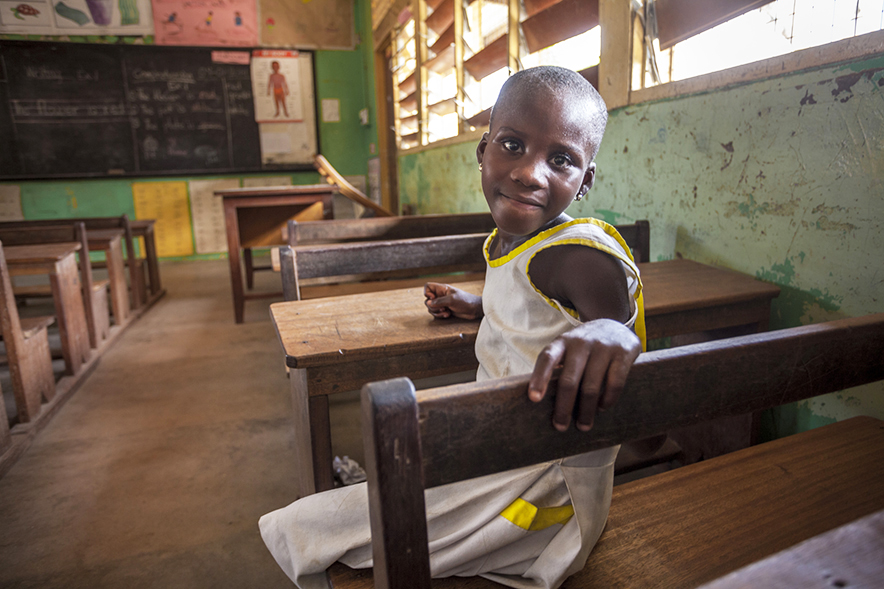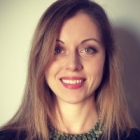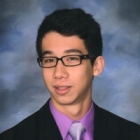Child Literacy Development in the Ivory Coast, W. Africa
Dr. Kaja Jasinska, Research Scientist at Haskins Laboratories, joins host, Frank Boudon, undergraduate student at Yale University. Dr. Jasinska, a cognitive scientist, describes her work on child development, its contribution to peacebuilding, and her current research on child literacy in low-resource settings in Cote D’Ivoire.
Child Literacy Development in the Ivory Coast
Guest, Kaja Jasinska, PhD, Haskins Laboratory
16 May 2016
Frank Boudon: I’m Frank Boudon, Yale undergraduate and interviewer for the Early Childhood Peace Building Consortium online platform. Today we will be speaking with Dr. Kaja Jasinska, a post-doctoral researcher at Haskins Laboratories in New Haven affliated with Yale University. Her research uses neuroimaging technology in combination with genetic and behavioral analyses to gain insights into language, reading, and cognition. One of Dr. Jasinska’s projects, supported by the Jacob’s Foundation, focuses on child literacy development in rural Cote D’Ivoire.
So Dr. Jasinska, can you give us an overview of your research on language and reading?
Kaja Jasinska: “Sure, I’m very happy too and very happy to have this conversation. So I’m a cognitive neuroscientist and I study child development. My work predominantly focuses on how the young child acquires language, how they learn to read, and how they acquire cognition, how cognitive development happens, from infancy through to the school years and into early adulthood. Now my work is definitely highly biologically informed and I’m interested in the biological mechanisms that shape development. And so I look at how, for instance, our genes drive the maturation of these systems and how the brain both in its structure and its function changes over development in order to give rise to cognition. Now, of course, there is a critical role for the kind of environment that a young child is born into and the development of the system. So the early life experience that a young child will have is a critical driver of their own development. So my recent work now is actually looking at how children acquire literacy, how they come to learn to read in an environment that is incredibly extreme. It’s an environment that has very high risk of illiteracy and so it presents the young child with extreme challenges on how they will actually learn to read. And that environment is a rural cocoa community in Ivory Coast.
So this new work I am doing that is funded by the Jacobs Foundation and partnering with their TRECC program, which stands for Transforming education in cocoa communities. And what we are trying to do is acquire a baseline understanding of how the development happens under conditions of extreme poverty. So these are communities that are incredibly under-resourced. Children are attending schools that have really absolutely nothing, there’s no running water, there’s no electricity, there is a dire need for teachers, and for quality teaching and quality instruction. And so it presents with a lot of difficulties and this is what my work is on these days.”
Boudon: Okay great, and so how does the work that you have been doing with cognitive development and literacy, specifically in Cote D’Ivoire and maybe elsewhere in the world, how does that relate more broadly to peacekeeping?
Jasinska: Well, I will answer the question first as a cognitive neuroscientist who studies development. So if you’re learning to read, and this is an integral part of development, learning to read doesn’t happen in a vacuum, it’s shaped by your language abilities, which are emerging over your development, and by your cognitive abilities, which are interacting, and the whole system is a very complex one. So for example, for a young child, and this is some of the work that other labs and many researchers today have been documenting including some of the work we’ve been doing here at Haskins labs affiliated with Yale, is looking at how, for instance, a young child’s awareness of the sounds that make up their language, their ability to manipulate those sound units, how this skillset is actually so critical for the literacy process. If you think about what a child is doing when they are coming to learn to read, they are going to be sounding things out and so having that language skillset is a very strong driver. Of course, multiple other things come into play, being able to attend to the words that you are reading, paying attention and focus, being able to keep all of this in memory as you are reading it, integrating incoming information into existing sentence structure. This is a very demanding cognitive challenge, and so the very act of learning to read actually shapes all these other systems.
And so, the bottom line is it’s good for the child’s development, right? So it’s good for having healthy, thriving children and healthy, thriving communities because of this very scientific perspective that I’ve outlined just now. So having a healthy, cognitive child means that the community will be thriving, which means that we can work towards a process where there will be peace. A basic science approach like this categorizes important information about the individual, the child themselves and then the community in which they find themselves. So we get a lot of information that is individual level and community level and these are the agents for peacebuilding, the individual and the community in which they find themselves. So at the very basic core of this, we need to have children that are healthy and thriving, individuals that are healthy and thriving in order to promote any peacebuilding initiatives. Obviously literacy is critical for anything, for academic success, for vocational success, economic success, and these are all things that equip a community to have peace and build peace. People can advocate for themselves, they’ll have access to information, which are critical components of a peaceful life.
Boudon: So based on the findings of your research in Cote D’Ivoire, do you have any plans moving forward or any recommendations for how to sort of improve literacy in those communities?
Jasinska: So the work in Cote D’Ivoire is just taking off now, so we have quite a ways to go right now. We’ve gone and we’ve been working with different sites, different levels of government, different levels of the community, to bring the scientific process and to be able to collect the type of data that we know is going to be very informative for both the educational systems there, for the intervention systems, the kind of information that we can equip governments and educators with that would be relevant. So for example, we talk a lot about, with very limited resources, how are we going to empower the child’s development. Well, that’s a very broad thing, there can be multiple aspects of that child’s development that could be targeted. In order to do that, we need to collect that basic information. And that’s sort of where we are in the process, collecting this basic information in order to then effect change. For instance, know when what kind of intervention we should implement, what specific system should it target, and when in the child’s development should we be targeting that? Because of course the process is very fluid and very plastic and at certain points in that child’s life they are more or less susceptible to different experience-driven changes.
Boudon: So what is your methodology with the data collection, what kinds of information are you looking for to analyze as you move forward?
Jasinska: This is a study where we are looking at using the tools, the basic tools of cognitive science, basic cognitive assessments that we’ve done tried and true here in the work that I’ve been doing in the U.S. and Canada. So things like measuring language abilities, like phonological awareness, simple tests where we play games with kids and we’ll say, “Can you say catch without the “cuh” sound?” So simple things that a five-year old, six-year old can do and the kids that tend to well on tasks like that tend to be better readers. We have kids reading words and reading made up words to see how well they can map the sound structure onto the word and generate an appropriate response. We have kids reading passages and answering questions about the short stories that they read in order to understand their comprehension. So these are the kinds of language and reading assessments we do, things like asking for opposites and same as. So these are very simple things. And then we have a cognitive area, where we for instance want to measure a child’s working memory, so how much information can they store and manipulate in real time as new information is coming in and things like asking them to remember a list and reorder that list in (continue)
JOIN THE CONVERSATION
For breaking news and to stay connected, follow us on social media. Sign up to get our E-News delivered straight to your inbox.




